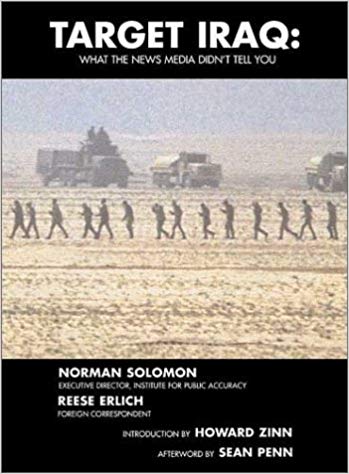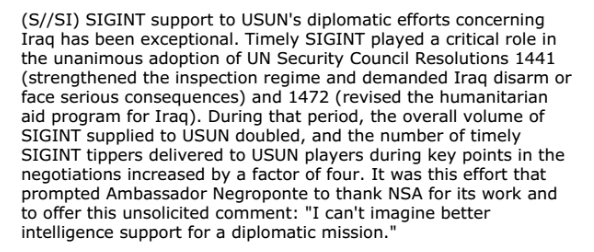Film Official Secrets Is Tip of Mammoth Iceberg
view post on FAIR.org
by Sam Husseini
Two-time Oscar nominee Keira Knightley is known for being in period pieces such as Pride and Prejudice, so her playing the lead in the new film Official Secrets, released in the US on Friday, August 30, may seem odd at first. That is, until one considers that the time span depicted—the early 2003 run-up to the invasion of Iraq—is one of the most dramatic and consequential periods of modern human history.
It is also one of the most poorly understood, in part because the story of Katharine Gun, played by Knightley, is so little known. I should say from the outset that having followed this story from the start, I find this film to be, by Hollywood standards, a remarkably accurate account of what has happened to date—”to date” because the wider story still isn’t really over.

The real Katharine Gun (photo: Sam Husseini)
Katharine Gun worked as an analyst for Government Communications Headquarters (GCHQ), the British equivalent of the secretive US National Security Agency. She tried to stop the impending invasion of Iraq in early 2003 by exposing the deceit of George W. Bush and Prime Minister Tony Blair in their claims about Iraq. She was prosecuted under the Official Secrets Act—a juiced-up version of the US Espionage Act, which has in recent years been used repeatedly by the Obama administration against whistleblowers, and now by the Trump administration against WikiLeaks publisher Julian Assange.
Gun was charged for exposing—around the time of Colin Powell’s infamous testimony to the UN about Iraq’s alleged WMDs—a top-secret US government memo from the NSA showing it was mounting an illegal spying “surge” against other UN Security Council delegations, in an effort to force approval for an Iraq invasion resolution. The US and Britain had successfully forced through a trumped-up resolution, 1441, in November 2002. In early 2003, they were poised to threaten, bribe or blackmail their way to actual United Nations authorization for the invasion. (See a recent interview with Gun .)
The leaked memo, published by the British Observer, was big news in parts of the world, especially the targeted countries on the Security Council, and effectively prevented Bush and Blair from getting the second UN Security Council resolution they said they wanted.
US government started the invasion anyway, of course—without Security Council authorization—by telling the UN weapons inspectors to leave Iraq and issuing a unilateral demand that Saddam Hussein leave Iraq in 48 hours—and then saying the invasion would commence regardless.
It was the executive director of the Institute for Public Accuracy (accuracy.org), where I work, Norman Solomon, as well as Pentagon Papers whistleblower Daniel Ellsberg, who in the US most immediately saw the importance of what Gun did. Ellsberg would later comment:
No one else—including myself—has ever done what Katharine Gun did: tell secret truths at personal risk, before an imminent war, in time, possibly, to avert it. Hers was the most important—and courageous—leak I’ve ever seen, more timely and potentially more effective than the Pentagon Papers.
Of course, we didn’t know her name at the time. After the Observer broke the story on March 1, 2003, we at accuracy.org put out a series of news releases on it, and organized a sadly sparsely attended news conference with Ellsberg on March 11, 2003, at the National Press Club, focusing on Gun’s revelations and Ellsberg’s call for more such truthtelling to stop the impending invasion.

Target Iraq, by Norman Solomon and Reese Erlich
Even though I followed this case for years, I didn’t realize until recently that our work helped compel Gun to expose the document. At a recent DC showing of Official Secrets, I learned that Gun had read a book co-authored by Solomon, published in January 2003, that included material from accuracy.org, as well as the media watch group FAIR, that debunked many of the falsehoods for war.
Said Gun about the period just before she disclosed the document:
I went to the local bookshop, and I went into the political section. I found two books, which had apparently been rushed into publication, one was by Norman Solomon and Reese Erlich, and it was called Target Iraq. And the other one was by Milan Rai. It was called War Plan Iraq. And I bought both of them. And I read them cover to cover that weekend, and it basically convinced me that there was no real evidence for this war. So I think from that point onward, I was very critical and scrutinizing everything that was being said in the media.
Thus in the film, we see Gun shouting at the TV to Tony Blair that he’s not entitled to make up facts—so the film may be jarring to some consumers of major media who think that Trump invented lying in 2017.
But Gun’s immediate action after reading critiques of US policy and media coverage makes a strong case for trying to reach government workers—handing out fliers and books, having billboards outside government offices—to encourage them to be more critically minded.
I honestly didn’t fully appreciate the value of the exposure as much as Dan and Norman did at the time. To my mind, the lies were obvious, as we debunked Bush administration propaganda in real time—see an overview of our work that I wrote to Rob Reiner when I learned of his then-upcoming film Shock and Awe. But Gun’s revelation showed that the US and British governments were not only lying to get to invade Iraq, they were engaging in outright violations of international law to blackmail whole countries to get in line.
It’s funny to read mainstream reviews of Official Secrets now—they seem to still not fully grasp the importance of what they just saw. The AV Club review ( 8/27/19) leads: “Virtually everyone now agrees that the 2003 invasion of Iraq was a colossal mistake based on faulty (at best) or fabricated (at worst) intelligence.” Well, “mistake” is a serious understatement, even with “colossal” attached to it, for something so fervently pursued, and you just saw a movie about the diabolical, illegal lengths to which the US and British governments went to get everyone in line for it. So, no, “fabricated” is not the “worst” it is.
Gun’s revelations showed before the invasion that people on the inside, whose livelihood depends on following the party line, were willing to risk jail time to expose the lies and threats.
Other than Gun herself, the film focuses on dramatizing on the tension in her workplace, as well as the impact on her relationship with her husband, who happened to be a Kurdish refugee from Turkey—whom the British government moved to deport in an attempt to get at Gun. The other key focuses in the film are her able legal team at the human rights law firm Liberty and the drama at the Observer, which published the NSA document after much debate.
Observer reporter Martin Bright, whose stellar work on the original Gun story was strangely followed by an ill-fated stint at the Tony Blair Faith Foundation, has recently noted ( The Nation, 8/16/19 ) that very little additional work has been done on this key case. We know virtually nothing about the apparent author of the NSA document—one “Frank Koza.” How prevalent is this sort of blackmail? How exactly is it leveraged? If the US government does this sort of thing, why would they wait until the last minute? Does it fit in with allegations made by former NSA analyst Russ Tice about the NSA having massive files on political people?
Observer reporter Ed Vulliamy is energetically portrayed by Rhys Ifans—at one point getting tips from an unnamed former CIA analyst who is clearly meant to be Mel Goodman. In a subtle departure from the historical record, Vulliamy is depicted in the film as actually speaking with “Koza,” but that’s not what he originally reported:
The NSA main switchboard put the Observer through to extension 6727 at the agency, which was answered by an assistant who confirmed it was Koza’s office. However, when the Observer asked to talk to Koza about the surveillance of diplomatic missions at the United Nations, it was then told, “You have reached the wrong number.” On protesting that the assistant had just said this was Koza’s extension, the assistant repeated that it was an erroneous extension, and hung up.
There must doubtlessly be many aspects of the film that have been simplified or altered regarding Gun’s personal experience; notably absent from the film is the role played by her parents, which I believe was considerable. A memoir from her would be a valuable historical document. A compelling part of the film—apparently fictitious or exaggerated—is the GCHQ security apparatchik questioning Gun to see if she leaked the memo, and laying stress on her ethical and educational background, particularly the fact that she was largely raised outside of Britain.
Gun’s revelations in all likelihood had the biggest impact on several non-permanent members of the Security Council members, especially Angola, Cameroon, Guinea, Pakistan, Mexico and Chile. I’ve seen very little about what exactly happened in those countries and in those delegations. The most is probably known about Mexico, which was represented by Adolfo Aguilar Zinser. After the invasion, he spoke in blunt terms about US bullying—saying it viewed Mexico as its patio trasero, or back yard—and was compelled to resign by President Vicente Fox. He then, in 2004 , gave details about some aspects of US surveillance sabotaging the efforts of the other members of the Security Council to hammer out a compromise to avert the invasion of Iraq, saying the US was “violating the UN headquarters covenant.” In 2005, he tragically died in a car crash .
Official Secrets director Gavin Hood is perhaps more right than he realizes when he says that his depiction of the Gun case is like the “tip of an iceberg,” pointing to other deceits surrounding the Iraq War. In a showing of Official Secrets in DC, Hood depicted those who backed the Iraq War as now having been discredited. But that’s simply untrue. Now-leading Democratic presidential candidate Joe Biden—who not only voted for the Iraq invasion, but presided over rigged hearings on it in 2002—has recently repeatedly falsified his record on Iraq at presidential debates, with hardly a murmur. Nor is he alone; those refusing to be held accountable for their Iraq War lies include not just Bush and Cheney, but John Kerry and Nancy Pelosi .
Biden has actually faulted Bush for not doing enough to get United Nations approval for the Iraq invasion. In fact, as the Gun case helps show, the legitimate case for invasion was nonexistent, and the Bush administration had done virtually everything both legal and illegal to get United Nations authorization.
Most everyone attempts to distance themselves from the Iraq invasion, but it has effectively enveloped our culture. The wars it spawned, as in Syria and Iraq itself, and arguably elsewhere, continue with minimal attention or protest. The US regularly threatens Iran, Venezuela and other countries. The journalists who pushed and propagandized in favor of the Iraq invasion are prosperous and atop major news organizations—the editor who argued most strongly against publication of the NSA document at the Observer, Kamal Ahmed, is now editorial director of BBC News.

Excerpt from internal NSA document commending staffers for the good job they did spying on the UN.
Though the US and Britain failed to get a second resolution before the invasion, they did get a resolution after the invasion, UNSCR 1472, effectively accepting the US as the occupying power in Iraq on March 28, 2003. (See the accuracy.org news release on the same day—”UN—Accessory After the Fact?”) Documents leaked by Edward Snowden and published by the Intercept in 2016 boasted of how the NSA “during the wind-up to the Iraq War ‘played a critical role’ in the adoption of UN Security Council resolutions. The work with that customer was a resounding success.” The relevant document specifically cites resolutions 1441 and 1472, and quotes John Negroponte , then the US ambassador to the United Nations: “I can’t imagine better intelligence support for a diplomatic mission.”
The British government—unlike the US government—did ultimately produce a study ostensibly around the decision-making leading to the invasion of Iraq, the Chilcot Report in 2016. But that report—called “devastating” by the New York Times ( 7/6/16)—incredibly made no mention of the Gun case . (See accuracy.org release from 2016: “ Chilcot Report Avoids Smoking Gun .”)
Thus, Official Secrets refers not only to the Official Secrets Act, but also to the actions of so many who revere officialdom, and abide by the decorum of not acknowledging clear truths that would show the brutal face of the authorities.
Spoiler: After Katharine Gun’s identity became known, we at the Institute for Public Accuracy brought on Jeff Cohen, the founder of FAIR, to work with IPA’s Hollie Ainbinder to get prominent individuals to support Gun. The film—quite plausibly—depicts the charges being dropped against Gun for the simple reason that the British government feared that a high-profile proceeding would effectively put the war on trial, which to them would be nightmare.
Some have said that what Gun did was ineffectual, that it didn’t stop the invasion. Some have said the same about the quasi-global February 15, 2003, protests against the invasion. It’s an absurd, rotten notion. The solution to some truthtelling not being enough to stop the war, as Dan Ellsberg would put it, is more truthtelling. The solution to some powerful protests not being enough to stop the war is more effective protests. Had there been coordinated global protests beginning in September 2002, for example, rather than February 2003, that could well have made all the difference. If other numerous government officials had done what Gun did, and spoken the truth when it mattered most, that could have made the difference.
And, as these wars and lies continue, it still may.
Featured image: Keira Knightly as Katharine Gun in Officials Secrets .
A version of this article appeared on Consortium News (8/29/19).
|
No comments:
Post a Comment